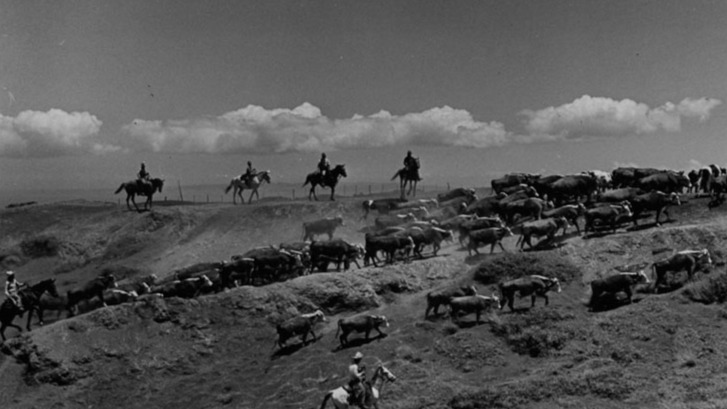
- Home
- Paniolo Hall of Fame
- Inductees
- David Kaʻanohiokala Keakealani

Year Inducted: 2024
1914-1999
Puʻuwaʻawaʻa Ranch | Hawaiʻi
Born in 1914 in the coastal village of Kaʻupulehu where they always traveled mauka to makai on foot or by donkey, mule or on horseback. This gave him an early appreciation for life kau lio (mounted).
David’s first job was with the Civilian Conservation Corps. He was assigned to North Kohala where they planted eucalyptus and ironwood trees. He became a “mule skinner” with a team of rejected plantation mules hauling out the logs of large trees. His respect for the mule as a draft animal developed after a few trips dragging logs from Kawaihae Uka to the shores of Kawaihae Bay. The mules became laka (tame) and eventually returned to the plantation.
David returned to Kona to cowboying at Puʻuwaʻawaʻa Ranch under foreman Lui Kainoa and alongside his brother Robert Keakealani. At the time, his own family was expanding in their ranch cabin at Puʻuanahulu. David demonstrated his skills in midwifery by delivering his two youngest daughters, Keala and Maile, that rounded out the line to five kaikamahine (daughers).
It was David’s gentle nature around horses and cattle the led to his becoming a credit to the Hind and Keakealani families. He trained top cowboy horses, his favorite being a colt named Palolo who dragged many claves to the branding fire. His keen eye for cattle made him vital to the Puʻuanahulu artificial breeding program under Dr. Powers of ABS, a program established by ranch manager Kuakini Cummins. David’s role was to ride among the purebred herd to pick out the cows in heat and drive them individually to the breeding corral for insemination. According to ranch manager Cummins, Dr. Powers was impressed with the accuracy of David’s sharp eye for cows in heat.
A cowboy’s life was where he wanted to spend his later years at Puʻuwaʻawaʻa Ranch. He quietly mentored many young paniolo to slow down, like the Alapai brothers, nephew Sonny, Fancis Haʻo, Wayne Kahalamu and others. You can just hear him say: malie, malie!
Soon David was alone to raise his five daughters, Piʻilani, Kehua, Lanihau, Keala, and Maile in the little ranch cabin along the cliff of Puʻuloa. From cooking to laundry, from housekeeping to yard keeping, God was acknowledging the beginning and ending of David’s days. He was thankful even if there was only a glass of water on the table for a meal. David teamed with his daughters on their individual pathways to adulthood, all while serving the Hind family with dignity.
When the ranch was bought by Dillingham and Carlsmith, David continued as a loyal paniolo with uniform service to the cows and horses and family into his retirement in the mid 1960s.